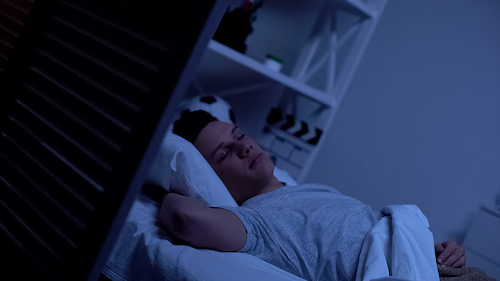 Teenagers who sleep poorly may be more likely to experience mental health challenges in later life.
Teenagers who sleep poorly may be more likely to experience mental health challenges in later life.
In research recently published in the Journal of Child Psychology and Psychiatry researchers from the University of Reading, together with Goldsmiths and Flinders University in the UK found that there was a significant link between poor sleep and mental health issues.
“We found that teenagers with anxiety and depression had more problems with sleep compared to teenagers who did not have anxiety and depression. Both disorders were associated with poor sleep quality, but teenagers with depression also reported less total sleep time,” Faith Orchard, study author and a lecturer in clinical psychology at the University of Reading told Theravive.
“Secondly, we found that these sleep problems at age 15 put teenagers at increased risk of developing both anxiety and depression at all three future time points (17, 21 and 24 years),” she said.”
In undertaking the study, the researchers analysed self-reported sleep quality and quantity from 4790 teenagers.
“There has been growing evidence of a causal relationship between sleep, anxiety and depression. However a lot of the research has been limited by brief measures of sleep and mental health, and has only been able to examine one time point in the future. Using data from the Children of the 90s cohort study allowed us to examine whether sleep problems at an important time during adolescence (when sleep and mental health difficulties are common), were predictive of both symptoms and diagnoses of anxiety and depression both later in adolescence and into early adulthood,” Orchard said.
They found that those who experienced depression had both poor quality and quantity of sleep but those with anxiety only had poor quality of sleep.
Notably, the difference in the average amount of time spent asleep between those who experienced depression and those who didn’t amounted to going to sleep just 30 minutes later each night.
Those who experienced depression got less than seven and a half hours of sleep on week nights and a little over nine hours sleep on the weekend. The control group of teens without a diagnosis of depression got roughly eight hours of sleep on week nights and just over nine and half hours of sleep on weekends.
In total, the group of teens with depression reported an average of 3325 minutes of sleep a week, while the control group without depression reported 3597 minutes of sleep a week. That’s a difference of 272 minutes or four and a half hours of less sleep a week.
Orchard says it is important teens have good sleep habits, though falling asleep a bit later is normal during teen years.
“It is important to recognise that young people do experience changes to sleep during teenager years, and this might mean that they don't fall asleep til later. This is not something to be too concerned about unless families are finding that sleeping habits are starting to cause problems, for example, struggling to fall asleep or excessive tiredness during the day. If this is the case, there are a number of tips and tricks that they could try to get into good sleep habits, such as maintaining consistent bed times at the week and the weekend, and helping to get the body ready for sleep. If families are particularly concerned, they should seek professional guidance,” she said.
She says it’s also important not only to focus on sleep quantity, but quality as well.
“The wider literature suggests that many adolescents (about two thirds) will experience problems with sleep quantity, due to changes in biological rhythms, school start times etc. Whereas problems with sleep quality seems to be more unique to mental health. However, this research does suggest that it is important to take care of both aspects during teenage years,” she said.
“We need to pay better attention to sleep in our teenagers. Not only does poor sleep have immediate negative consequences such as on concentration, and mood, but it might put young people at risk of longer term difficulties.”
Elizabeth Pratt is a medical journalist and producer. Her work has appeared on Healthline, The Huffington Post, Fox News, The Australian Broadcasting Corporation, The Sydney Morning Herald, News.com.au, Escape, The Cusp and Skyscanner. You can read more of her articles here. Or learn more about Elizabeth and contact her via her LinkedIn and Twitter profiles.